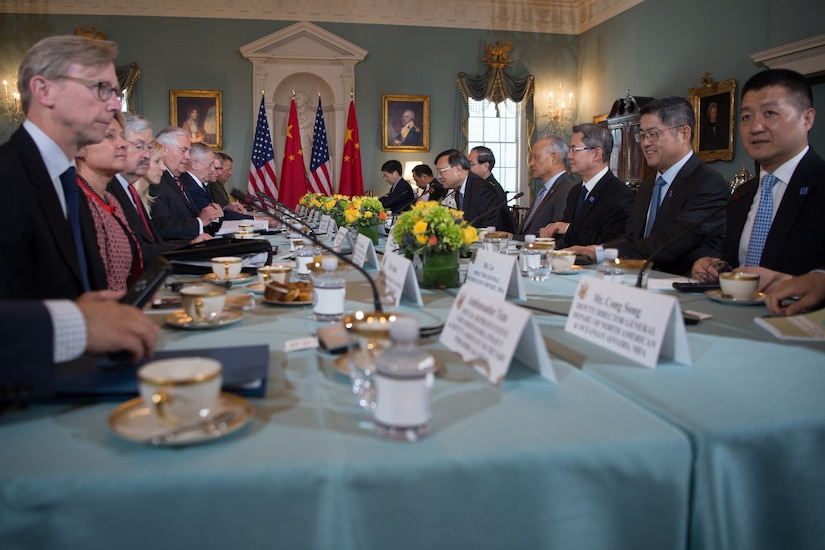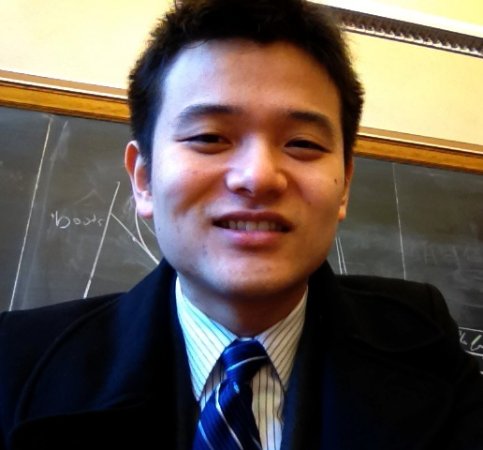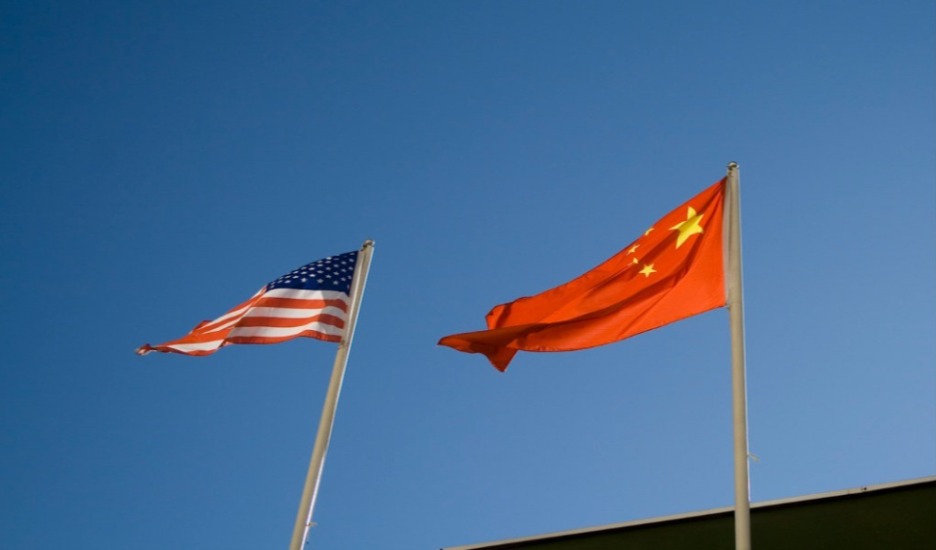Water Wars: The South China Sea Security Dialogue That Wasn’t
U.S. and Chinese Officials Meet for Inaugural High-Level U.S.-China Diplomatic and Security Dialogue, But South China Sea Issues Feature Less Prominently Than Anticipated
Published by The Lawfare Institute
in Cooperation With

U.S. and Chinese Officials Meet for Inaugural High-Level U.S.-China Diplomatic and Security Dialogue, But South China Sea Issues Feature Less Prominently Than Anticipated
American and Chinese Officials Meet at the U.S.-China Diplomatic and Security Dialogue in Washington, D.C. (Photo: Washington Post)
The United States and China participated in the inaugural U.S.-China Diplomatic and Security Dialogue (D&SD) on Wednesday in Washington, D.C.. The negotiations were initially launched by President Trump and President Xi on April 7 in Mar-a-Lago. Secretary of State Rex Tillerson and Secretary of Defense Jim Mattis hosted Chinese State Councilor Yang Jiechi and General Fang Fenghui, Chief of the PLA’s Joint Staff Department.
Though other issues, such as North Korea, were expected to feature prominently, both sides expressed interest in renewed dialogue over the South China Sea dispute. As noted in a “preview” of the dialogue offered by Susan Thornton, the U.S. Acting Assistant Secretary for East Asian and Pacific Affairs, the United States went into the D&SD dialogue with the position that activity on disputed islands and reefs should be halted. “Now that there has been some move to continue with diplomatic resolution of these issues through discussions among ASEAN on the code of conduct,” she said, “what we think should happen is that all parties should freeze any construction or militarization of features that they have outposts on in this space, and make room and create the conditions for diplomacy.”
Chinese Foreign Ministry spokesperson Geng Shuang stated the Chinese position in his regular press briefing on the day before the talks: “Now with the concerted efforts of China and ASEAN countries, the situation in the South China Sea is turning better while maintaining stability…We hope relevant parties will respect the efforts by regional countries to peacefully resolve the issue through negotiation and consultation and do more things that are conducive to regional peace and stability.” This was, he said, a “principled position” that China had “stated…many times.”
However, at the talks, the issue of North Korea’s nuclear program seems to have dominated, and little apparently changed with respect to the parties’ stances on the South China Sea – a situation that one analyst described as “underwhelming.” On Wednesday, Secretaries Tillerson and Mattis released a joint press statement, indicating that the United States and China “had a frank exchange of views on the South China Sea.” Secretary Tillerson reported that, in accordance with Acting Assistant Secretary Thornton’s comments, “The U.S. position remains unchanged. We oppose changes to the status quo of the past through the militarization of outposts in the South China Sea and excessive maritime claims unsupported by international law, and we uphold the freedom of navigation and overflight.” He said that “China has committed to resolving their disputes peacefully and in accordance with recognized principles of international law, including the UN Convention on the Law of the Sea.”
Secretary Mattis added that the two sides were trying to work through “disconnects, where our understanding of the problem is very different from theirs.” He reported that the two sides “discussed the importance of freedom of navigation, and…ways to decrease tension and reduce risk in the South China Sea.” However, he said, “The United States will continue to fly, sail, and operate wherever international law allows.”
Reporting on the talks, Xinhua reported that China re-asserted its position that it has “indisputable sovereignty” over the South China Sea islands.
In Other News…
Vietnam
Vietnam welcomed a Chinese military delegation last Sunday led by General Fan Changlong, Vice Chairman of China’s Central Military Commission. Fan was accompanied by Commander of the People Liberation Army (PLA) Southern Theater Command Yuan Yubai, Chief of Staff of the PLA Army Liu Zhenli, Deputy Commander of the PLA Navy Liu Yi, and others. The delegation held meetings with Vietnam’s top military, civilian and party leadership: President Tran Dai Quang, Prime Minister Nguyen Xuan Phuc, Defense Minister Ngo Xuan Lich and General Secretary of the Central Committee of the Communist Party of Vietnam Nguyen Phu Trong. According to China’s Ministry of National Defense, General Fan reaffirmed China’s stance that the South China Sea islands have been China’s sovereign territory since ancient times, while Defense Minister Lich emphasized the cooperation between the Vietnamese and Chinese militaries on border defense, peacekeeping, and search and rescue at sea.
After meeting with Vietnam’s top leaders in Hanoi, the Chinese delegation was scheduled to travel north to the border province of Lai Chau to participate in the fourth Vietnam-China Border Defense Friendship Exchange, an initiative aiming to foster solidarity between local governments and border guard forces. However, the trip was cut short when the Chinese delegation left Vietnam on Tuesday, the same day the gathering at the border was set to begin.
While Chinese state-run media outlet Global Times attributed the abrupt change in plans to “reasons related to working arrangements,” The New York Times has reported that the Chinese delegation left Vietnam after a contentious meeting about the South China Sea.
With the Vietnamese and Chinese Ministries of Foreign Affairs not providing more information on the cancelled meetings, analysts have been left to speculate about what may have caused this diplomatic blowup. Some analysts have pointed to Vietnam’s refusal to abandon oil and gas exploration in areas of the South China Sea. Others have suggested that General Fan was angry about Vietnam’s efforts to bolster strategic cooperation with Japan and the United States, as evidenced by the Vietnamese Prime Minister’s recent trips to the two countries.
Another source of tension may have been a declaration last week by a spokesperson for Vietnam’s Foreign Ministry urging China to “act responsibly and constructively in the maintenance of peace and stability” in the South China Sea. The statement was made in response to a question about a Pentagon report released earlier this month that detailed China’s military buildup in the South China Sea including in the Spratly and Paracel islands. The spokesperson went on to declare that that any activities by foreign countries on these islands that have not been authorized by Vietnam were “completely illegal.”
Japan
Japan took steps this week to foster closer military ties with ASEAN member states. On Monday, military officers from ASEAN countries embarked on a four-day tour of the South China Sea aboard a Japanese, Izumo-class helicopter carrier. On Tuesday, a separate group of ASEAN military representatives arrived in Japan for a three-day trip to observe Japan’s Self-Defense Force conduct military disaster relief drills. The Japanese government’s efforts to solidify its military ties with Southeast Asia have not been limited to direct military to military relations. Earlier this month, the Japanese Ministry of Defense invited representatives from the militaries of Indonesia, Malaysia, the Philippines, Singapore, Thailand and Vietnam to a seminar on military technology. According to Reuters, the seminar was scheduled so that these representatives could also attend Maritime Air System and Technologies (MAST) Asia, an increasingly popular, annual international defense-trade show near Tokyo that provided the Japanese defense sector with an opportunity to highlight their products. Sponsored by multiple Japanese ministries, MAST Asia is seen as part of Japanese Prime Minister Shinzo Abe’s larger strategy of developing Japan’s defense industry in an effort to counter China’s influence in the South China Sea.
To that end, Japan’s Coast Guard took a step forward in its cooperation with Vietnam’s maritime law enforcement agency by successfully completing a training exercise to combat illegal fishing. While the two agencies completed have previously conducted smaller search-and-rescue drills, this exercise was the first one focused on illegal fishing. The drills, which were originally suggested by Vietnam, took place off the coast of Danang, a port city in central Vietnam. According to NHK, Japan’s national public broadcasting organization, a Japanese Coast guard official expressed confidence that Japan and Vietnam’s maritime agencies “will continue to cooperate to address all kinds of threats to ensure free, stable and open seas and contribute to peace and prosperity of the region.”
Meanwhile, Japan’s Maritime Self-Defense Force (MSDF) announced that it recently concluded joint naval drills with the U.S. Navy in the South China Sea. The exercises, which were held from June 13 to June 15, involved Japanese MSDF destroyers and the USS Ronald Reagan, a nuclear-powered aircraft carrier. The announcement was noteworthy because it was reportedly the first time a joint drill with MSDF vessels and a U.S. aircraft carrier was officially confirmed.
South Korea
South Korea and Japan were engaged in another round of diplomatic rebukes over the Liancourt Rocks, referred to as Takeshima in Japan and Dokdo in South Korea, which controls the islets. The latest spat arose from the inclusion of Japan’s claims over the islets in elementary and middle school teaching manuals. In a statement posted on its website, the South Korean ministry of Foreign Affairs marked its strong protest of “Japan’s repeated and unjustified claims to our territory, Dokdo” and demanded the immediate withdrawal of such claims. This reprimand came days after Japan’s Minister of State for Ocean Policy Jun Matsumoto told reporters that the contested islets are Japan’s sovereign territory. Matsumoto’s comments were made in response to a question about South Korea’s bi-annual drills around Dokdo, which took place last week.
The South Korean Navy announced that it will hold live-fire naval exercises with the United States and Canada. The three-day training exercise will be held this weekend off the waters of Jeju Island. The South Korean military also confirmed that a crashed drone found near the Demilitarized Zone was sent by North Korea to take aerial photographs of a U.S. missile defense system site. At least ten of the hundreds of pictures found in the camera attached to the drone were of the site in Seongju, South Korea where the Thermal High Altitude Missile Defense System is scheduled to be installed. The South Korean military denounced North Korea’s deployment of the drone as a “grave provocation” that violated the Korean War truce.
These tensions with Japan and North Korea, as well as South Korea’s decision to delay installation of THAAD, set the stage for next week’s visit to Washington by new South Korean President Moon Jae-in. In an overture to the Trump administration, Moon offered praise for President Donald Trump in an interview with CBS, while calling former President Barak Obama’s strategy on North Korea a failure.
Analysis, Commentary, and Additional Information
Responding to Ely Ratner’s suggestion last week that the United States should shed “its position of neutrality” vis-à-vis China in favor of a policy of “muscular deterrence,” Lawfare’s Julian Ku points out some of the potential dangers of a more aggressive American stance towards China. In particular, Ku says, Ely’s suggestion of stationing U.S. troops on islands and reefs held by the Philippines, Taiwan, and other South China Sea nations could be viewed by China as an invasion of territory over which it claims “indisputable sovereignty.” While this position might be sensible from a policy standpoint, he argues, “from a legal perspective, taking side sin sovereignty disputes will lead to serious complications.”
Jia Qingguo, dean of the department of diplomacy at Peking University, discussed the increasing role that China’s may play in world affairs at a Heritage Foundation panel on Tuesday. Jia said that China currently lacks the military strength and economic sway to take up the United States’ role as the chief guarantor of the international order. As such, China’s role is merely to “help the United States” where possible, while “expect[ing] the United States to live up to its responsibilities.” David Finkelstein, director of China studies at CNA and another panelist, said that such behavior mirrored that of previous rising powers in history, biding their time as their power increased.
Former U.S. Deputy Secretary of State and Governor of the World Bank Robert Zoellick addressed the related question of whether China is becoming a “responsible stakeholder” in the international system. Zoellick told the Nikkei Asian Review that this was still “an open question.” He argued that China is “testing” the resolve of the global community in the South China Sea – and that the United States should push back. “I think it is important that the U.S., Japan, Australia and other countries make clear that there are certain principles, such as the maritime rights and freedom of sea that we will push to protect,” he said.
Harvard Professor Joseph Nye, writing for the Australian Pacific Policy Institute’s Strategist, argues that China’s “belt-and-road” initiative, which seeks to invest heavily in infrastructure projects in Europe, Asia, and East Africa, echoes the “old geopolitical proposition…that whoever controlled the world island of Eurasia would control the world.” By contrast, Nye argues, American grand strategy has followed the teachings of Admiral Alfred Thayer Mahan, “who emphasized sea power and the rimlands.” Nye says that China’s recent nationalism-driven spat of maritime territorial disagreements with its neighbors would likely “drive them into America’s arms.”
Water Wars is our weekly roundup of the latest news, analysis, and opinions related to ongoing tensions in the South and East China Seas. Please email Sarah Grant with breaking news, relevant documents, or corrections.





.jpg?sfvrsn=5a43131e_9)

